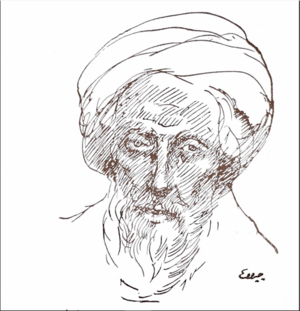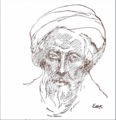Ibn al-Farid facts for kids
Quick facts for kids
Ibn al-Farid
|
|
|---|---|
 |
|
| Born | `Umar ibn `Alī ibn al-Fārid عمر بن علي بن الفارض 22 March 1181 Cairo, Ayyubid Egypt, now Egypt |
| Died | 1235 (aged 54-55) Al-Azhar Mosque, Cairo, Ayyubid Sultanate |
| Resting place | Mokattam Hills, now City of the Dead (Cairo) southeastern Cairo, Egypt |
| Occupation | Arabic poet, writer, philosopher |
| Notable works | Diwan Ibn al-Farid دیوان ابن الفارض |
Ibn al-Farid (born March 22, 1181, died 1235) was a famous Arab poet. His full name, `Umar ibn `Alī ibn al-Fārid, means "son of the obligator." This is because his father was known for helping people divide inheritances fairly.
Ibn al-Farid was born in Cairo, Egypt, but his parents were from Hama in Syria. He lived for some time in Mecca, a holy city, before returning to Cairo, where he passed away. His poems are all about Sufism, which is a spiritual path in Islam. Many people consider him the greatest mystic poet among Arabs. Some say he wrote his poems during special spiritual moments called "ecstasies."
His poetry is seen as a high point of Arabic mystical verse. Even though he's not very well known in the West, his work is deeply respected. (Another famous Sufi poet, Rumi, wrote mostly in Persian, not Arabic.) Ibn al-Farid's two most famous works are "The Wine Ode" and "The Poem of the Sufi Way." "The Wine Ode" talks about the joy of connecting with God. "The Poem of the Sufi Way" explores spiritual experiences on the Sufi path. It might be the longest mystical poem ever written in Arabic. Both poems have inspired many deep spiritual explanations over the centuries. Even today, Sufis and other devout Muslims still memorize them.
Contents
Biography
Ibn al-Farid's father moved from his hometown of Hama in Syria to Cairo, where Ibn al-Farid was born. Some stories say his father was a respected "farid," meaning he helped women with legal issues. Other stories say he divided inheritances. Both ideas could be true, meaning he often helped women with inheritance cases. Either way, Ibn al-Farid's father was a wise scholar. He made sure his son had a strong education in literature and writing.
When he was a young man, Ibn al-Farid often went on long spiritual journeys. He would spend time alone in the oases outside Cairo, like the Oasis of the Wretches. However, he felt he wasn't making enough spiritual progress. So, he stopped his wandering and joined a madrasa, which is a religious school. There, he studied Shafi'i law.
One day, Ibn al-Farid saw a greengrocer washing himself for prayer outside the madrasa. The man was doing the washing steps in the wrong order. When Ibn al-Farid tried to correct him, the greengrocer looked at him and said, "Umar! You won't find enlightenment in Egypt. You will only find it in the Hijaz, in Mecca…"
Ibn al-Farid was shocked by this. He realized this simple greengrocer was no ordinary person. He explained that he couldn't travel to Mecca right away. Then, the man gave Ibn al-Farid a vision of Mecca right then and there. Ibn al-Farid was so moved by this experience that he left for Mecca immediately. He later said, "Then as I entered it, enlightenment came to me wave after wave and never left."
Ibn al-Farid stayed in Mecca for fifteen years. But he eventually returned to Cairo. He said he heard the same greengrocer calling him back to attend his funeral. When he arrived, he found the greengrocer about to die, and they said their goodbyes.
When Ibn al-Farid returned to Cairo, people treated him like a saint. He held teaching sessions with important city leaders, including judges and viziers. When he walked down the street, people would gather around him. They wanted his spiritual blessings and tried to kiss his hand. He would respond by shaking their hands instead. Ibn al-Farid became a scholar of Muslim law. He also taught about the hadith, which are the sayings and actions of the prophet Muhammad. He was also a respected teacher of poetry.
Unlike many other poets of his time, Ibn al-Farid refused money from rich government officials. These offers would have meant he had to write poems for their propaganda. He preferred a humble life as a teacher. This allowed him to write his spiritual poetry freely. Once, al-Malik al-Kamil, the sultan at the time, loved some of his poems. He sent Ibn al-Farid a huge amount of money and offered to build a shrine for him. Ibn al-Farid turned down both the money and the shrine. He chose to trust God to provide for his needs. His job as a teacher at the Al-Azhar Mosque helped him support his family, which included three children.
Death and Burial
Ibn al-Farid died in the Al-Azhar Mosque. He was buried in the Qarafah cemetery. This cemetery is at the foot of Mount Muqqattam, near the al-Arid mosque. His burial was delayed because the grave wasn't fully dug. Some people said this was a way to "chastise him for claiming such a high status in love." Others believed it was "just the last small hardship that one of God's chosen must face in this world."
Ecstasies
Later in his life, Ibn al-Farid was known to enter into deep spiritual states. These are called jadhabat in Arabic and are common in sufism.
Normally, he was described as handsome. His son wrote that when a mystical state came over him, his face would become even more beautiful and bright. Sweat would pour from his body and collect on the ground beneath his feet. This happened because he would sometimes jump and dance. He also went on forty-day fasts, during which he would not eat, drink, or sleep.
During one special ecstasy, Ibn al-Farid screamed out and danced in the middle of the market bazaar. Other people in the market started to join in and dance with him. This caused a big commotion. The crowd carried Ibn al-Farid to the al-Azhar mosque. He stayed in this special state for several days afterward.
Ibn al-Farid claimed to see many things that seemed out of this world. He wrote about a lion kneeling down and asking him to ride it. He also wrote about seeing a man floating down a mountain without using his feet. He claimed that a "great green bird" came down at the greengrocer's funeral and "gobbled up his corpse." He also said he talked with Muhammad in a dream.
Ibn al-Farid's son, Kamal al-Din Muhammad, described his ecstasies or trances. He said they sometimes lasted ten days in a row. During these times, he would not eat, drink, move, speak, or hear outside noises. He would stand, sit, lie on his side, or "throw himself down on his side." When he came out of a trance, his first words would be the verses God had given him.
Legacy
Every Friday, people in Cairo gather at Ibn al-Farid's tomb. They go there to listen to readings of his poems.
In the 16th century, there was a Sufi group in Egypt called "al-Fāriḍīyah." It was believed to have started from Ibn al-Farid's teachings. However, this group no longer exists today.
Because of the beautiful words and spiritual topics in his poems, Ibn al-Farid later became known as "sultan al-ashiqin." This means "the sultan of lovers."
Moulid of Ibn al-Farid
There is a special celebration for Ibn al-Farid called a moulid. It starts with a procession in Cairo. This procession travels through old Mamluk graveyards, known as the "City of the Dead." It ends at Ibn al-Farid's tomb, which is at the base of Mount al-Muqaṭṭam in eastern Cairo. The moulid continues for two more days of meditation, prayers, and dancing. The dancing and procession have a trance-like feel, connecting to Ibn al-Farid's Sufi background. This is one of the smaller moulids in Cairo, and not many Cairenes know about it. Usually, a few hundred people attend.
Images for kids
See also
 In Spanish: Ibn al-Farid para niños
In Spanish: Ibn al-Farid para niños


